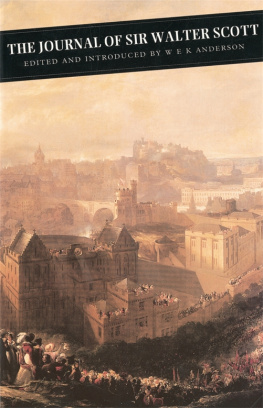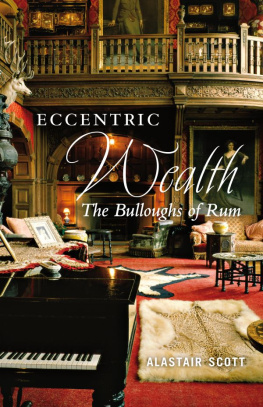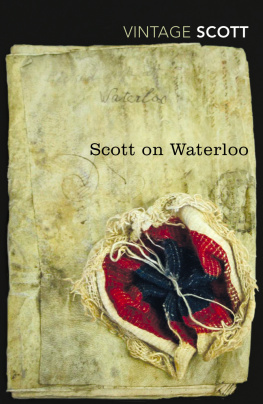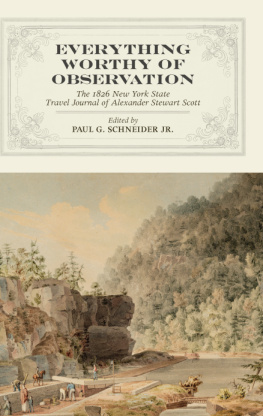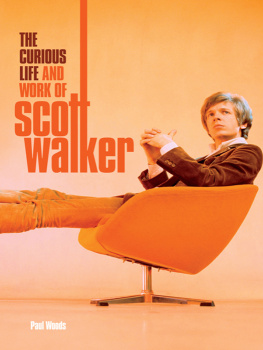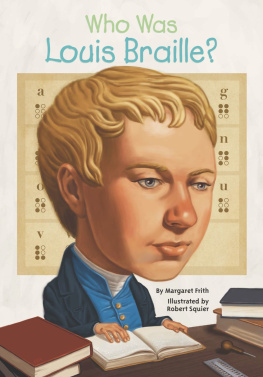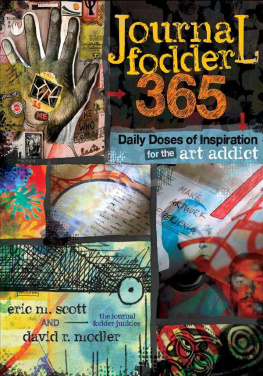Scotts daughter Sophia and her husband, John Gibson Lockhart, may be considered the first editors of Scotts Journal. Sophia wrote out a longhand version of the text which was then set up in type for her husband to read. Lockhart selected lengthy extracts for his Life ofScott, published in 1837, and added only a few notes, since his narrative provided what the reader was likely to want to know.
The next edition of the Journal, (the first in which is appeared as a work in its own right) was brought out by David Douglas in 1890. Again the task of establishing the text was not undertaken by the editor, but in this case by his friend Professor Hume Brown. No one who is familiar with the difficulty of reading Scotts handwriting in his later years will underestimate the problems he faced, and, as Victorian editions go, it is quite acceptable, even if it does not entirely merit Professor Massons description of it in an early review as Sir Walter Scotts Journal in perfect form and with all requisite annotations. The text has a number of inaccuracies, corrections were made without any indication of the original readings, and passages were omitted without comment; but Douglas knew his Scott well, and his notes (especially to the new edition of 1927) are helpful.
The Journals next editor was John Guthrie Tait, who set out to revise the Hume Brown text from a photostat in the National Library of Scotland. Unfortunately the work was still incomplete at his death, but the last third was undertaken by W. M. Parker, who proved a better reader of Scotts hand than any of his predecessors. The result was a text superior to Douglass, although the untimely death of Tait left it unsupported by adequate notes. It appeared in three volumes in 1939, 1941, and 1946, and was reprinted in one volume in 1950.
None of these editions seriously misrepresents Scott in major matters. Each of them, however, has its textual inaccuracies and omissions, and an index which leaves something to be desired. In the footnotes there is no systematic attempt to supply the reader with the information that he needs about the people and events of the Journal. It seemed that there was room for a new and more fully annotated text. That was what I was attempting to provide for the Clarendon Press in 1972. This present Canongate Press edition is in fact the paperback edition of that work, with some minor corrections and additions.
My aim has been to provide a complete and accurate version of what Scott actually wrote, with notes which in effect expand the work into a day-by-day biography of Scotts final years. As it happens, Scotts life at this time is exceptionally fully documented. A vast number of the letters he wrote survive, either published or still in manuscript; almost all the letters written to him during these years are preserved, along with dozens written about him by members of his family. We have the business letters and the diary of his publisher, and the minute-book of his trustees. Everyone who met him was likely to record the hours they spent in the company of so famous a man. On this wealth of published and unpublished biographical material, most of it in the great Scott collection of the National Library of Scotland, I have been able to draw freely for the notes.
In editing the Journal I have constantly had in mind the aim of producing a readable as well as an accurate edition. Some explanation of the editorial practices adopted may be helpful.
In order to keep the foot of the page as clear as possible of unimportant textual emendations, obvious slips of the pen have been corrected silently. All except repetitions like the the have been listed in Appendix F. Mistakes which are of any interest for the light they throw on Scotts mind or, in some cases, on his pronunciation, have, however, been left in the text and corrected in a footnote.
The spelling and capitalization of the original have been retained, and the editorial punctuation kept as light as possible, in an attempt to retain something of the liveliness and spontaneity of the original that had been lost in previous editions. For reasons of readability or typographical consistency, however, the following alterations have been made:
A full stop has been supplied where, as is often the case, Scott omitted it before a following capital letter.
Brackets, inverted commas, and parentheses between dashes have been closed without comment where Scott forgot to close them. On a few occasions a capital letter has been supplied at the start of direct speech.
The dot after Dr., Mr., and Mrs., which Scott sometimes added, is supplied in every case, and the elevated letter occasionally used by Scott in these and other abbreviations has been brought down.
Ampersands, which Scott frequently but not invariably used, have been expanded.
To-day and tomorrow, which often appear as two words in the original, have been spelt throughout as they are here. Titles of books and names of ships, as well as quotations from foreign languages, have been set in italics. Scott occasionally underlined words in Latin or French but his practice was not consistent.
Titles of poems, songs, and pictures have been placed in editorial inverted commas and given the usual capital letters.
Date headings have been printed in the form most commonly used by Scott, as plain figures. Where the entry has been assigned to the wrong day in the original, the correct date is used and an explanation added in a footnote or in Appendix E.
Editorial punctuation, where the meaning would otherwise be in doubt or the sentence difficult to read, has been sparingly added. All but a few commas, semicolons, and question-marks are editorial. Colons and exclamation-marks are Scotts, as are dashes and all full stops except those mentioned above.
Emendation has been as sparing as possible. When we have Scotts warrant for it a solecism in point of composition like a Scotch word in speaking is indifferent to me I have not emended who to who [m] (p. 530), nor supplied a verb in such entries as This a morning of fidgetty nervous confusion (p. 384), nor obscured Scotti- cisms like out the Bay (p. 761) by inserting[of]. Max has not been expanded to Max [popple], nor the D. of B. to the D [uke] of B [uccleuch], since the flavour of the work depends so much on the hurried inconsequential jotting down of names and impressions. Obvious omissions have, however, been supplied. They appear in square brackets, thus [ ]. These additions have always been made reluctantly, but with least timidity when the omission occurs at the end of a line or page. Scotts mind moved faster than his hand, and it is at these places that syllables or whole words are most apt to be lost. Irritabi [lity] (p. 68) and imagina [tion] (p. 81), for instance, are the final words in their lines. Words which Scott should have omitted for the sake of the sense are enclosed in angular brackets, thus < >.
It was tempting to emend the last hundred pages of the text very considerably. I was reluctant, however, to obscure the hideous paralytick custom of stuttering which Scotts pen acquired in his later years, and decided to leave untouched, as far as possible, the mis-spellings and repetitions which so vividly illustrate the decline of his powers. The strangely garbled words of the final months are to be ascribed, therefore, to the confusion of Scotts mind, not to an inattentive reading of the proofs.
Deletions have not been retained. They are relatively few and for the most part without interest. Those of any importance are recorded in footnotes.
Mis-spellings, both Scotts habitual ones and those caused in his later years by confusion of mind, have been retained. The words for which Scott had his own personal spelling are accomodation, aflicted, astmha, embarassing, knowlege, plege (for pledge), segar, shufle, stopd (for stopped), untill, and wellcome. In addition he usually, but not invariably, shortened the verb-ending ed to plain d.

